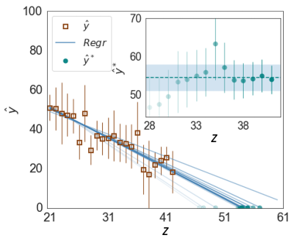Advanced Triple-Regression Algorithm for Customized Long-Term Forecasting
Abstract
This study introduces an innovative multi-variate triple-regression algorithm designed to forecast personalized airborne-pollen allergy seasons over extended periods. Our approach begins with preprocessing, where we integrate historical pollen data with inferential signals from various covariates, including meteorological information. The algorithm comprises three sequential regression stages: the first stage employs a regression model to predict the allergy season's start and end dates using a feature matrix derived from 12 time series covariates with a rolling window technique. The second stage predicts the uncertainty of these dates based on the feature matrix and Stage 1 outcomes. Finally, the third stage uses a weighted linear regression model, leveraging results from the previous stages, significantly enhancing forecasting accuracy and reducing uncertainty. This algorithm allows for individual customization based on varying pollen-triggered allergy sensitivities. Our backtesting results show a mean absolute error of 4.7 days, underscoring the potential of this method for both general and long-term allergy season predictions.




